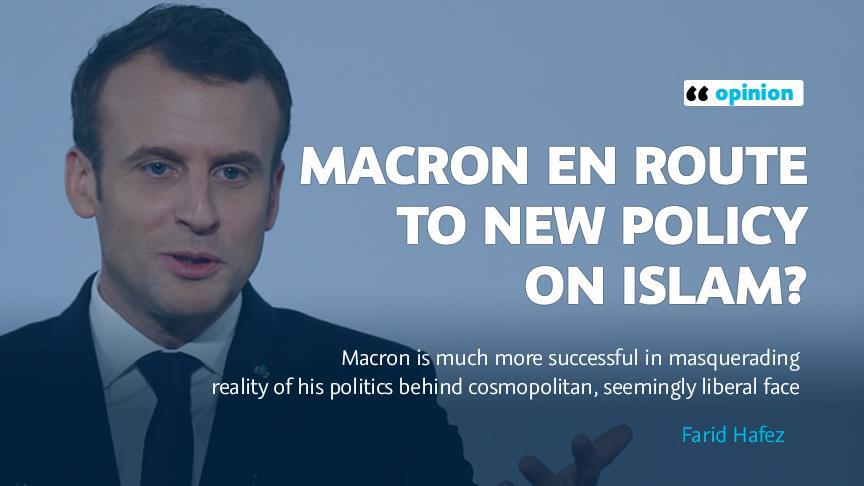OPINION - Macron en route to new policy on Islam?
Macron is much more successful in masquerading reality of his politics behind cosmopolitan, seemingly liberal face

By

WASHINGTON
While most Western liberals continue to claim French President Emmanuel Macron as their champion, the realpolitik behind his rhetoric is far more worrisome than one might assume. In contrast to Donald Trump, whose lies have continuously been identified, Macron is much more successful in masquerading the reality of his politics behind a cosmopolitan and seemingly liberal face.
A new pro-business labor law and university reforms that restrict admission procedures have passed without much protest. The latest target of the reform was immigration policy to be introduced in February or March, which sparked criticism from leading human rights groups as well as a constitutionally mandated ombudsman. Amid these restrictive policies, Macron made headlines by calling for a "reorganization of Islam" in France.
Macron already tried to impress the Muslim electorate during the elections. He would not repeat the discourse on French national identity and laïcité [French secularism] that excludes Muslims from the collective French body. Many Muslims felt some optimism.
Some of
Macron argued that he was “working on the structuring (he used the word “structuration”) of Islam in France and also on how to explain it, which is extremely important”.
The ultimate aim of this process is the preservation of national cohesion, Macron argued, which would stand at the heart of the French idea of secularism to give people the freedom to choose to believe or not to believe. But at the same time, he also argued that this would be part of an effort to “fight fundamentalism”.
This idea of
Macron’s plan, which has not yet been revealed in full detail, seems to be based on numerous views: One is the financing of Islam and the second is the training of Imams in France. Establishing a “Grand Imam of France” seems to be one aspect of this restructuring.
Macron explicitly argued that he wants to “reduce the influence of Arab countries”, which, for him, “prevents French Islam from returning to modernity”. This reflects a very racist notion, assuming that Europe represents the height of civilization, while Arabs stand for backwardness. But this topos legitimizes his demand for restricting foreign governments from funding Muslim institutions in France.
Institutionalizing Islam would mean shifting Muslims away from a law that regulates non-profit associations to a law that regulates cultural associations and is under stricter financial control by the state. The French interior minister already said that the French government should intervene and create “imams of the French Republic” instead of “imams of foreign countries”.
While this argument does make sense insofar as imams should not be representatives of foreign governments, proofs must be presented that this is the case at hand.
The interior minister represented a hard line on this issue: “I suggest stopping
Again, this seems to target Muslims first and foremost, while giving other religious denominations space to have transnational relations, getting financial support from abroad, like, for instance, Mormon missionaries or the Vatican helping the Catholic Church.
This reminds us of similar initiatives in other European countries. Similar to other initiatives, this French plan -- which shall be announced in greater detail within the next half year -- is followed no less vigorously by the Interior Ministry. Also, in 2017, the Italian government proclaimed its attempt to create an Italian Islam.
Again, this was done by the Italian Interior Ministry. And the Austrian Interior Ministry was initiating a process to create a new Islam Act, which was finally introduced in 2015 under severe criticism.
Also, in Germany, it is the Interior Ministry which initiated the German Islam Conference back in 2007, which also led to lots of criticism. A structural trait of these policies is a relatively soft discourse accompanied by hard policies.
The newly elected Austrian Chancellor Sebastian Kurz is probably an ideal example of this strategy. While fully endorsing the statement that Islam was part of Austria and hence winning the hearts of many Muslims, he later introduced the most authoritarian system of institutionalizing Islam in Austria, again with a smiling face.
Emmanuel Macron argues that “the state should be neutral” in France, which, according to him, “is at the heart of secularism”. This claim is very much true. But it would fundamentally contradict postulated restrictions on Muslim institutions such as regulating their finances and seeing only French-educated Muslims as the good Muslims, while foreign-educated ones are the bad ones. It will be important to keep a close look at the proposals, which Macron promised to present within the next six months.
*Opinions expressed in this piece are the author’s own and do not necessarily reflect Anadolu Agency's editorial policy
Anadolu Agency website contains only a portion of the news stories offered to subscribers in the AA News Broadcasting System (HAS), and in summarized form. Please contact us for subscription options.







